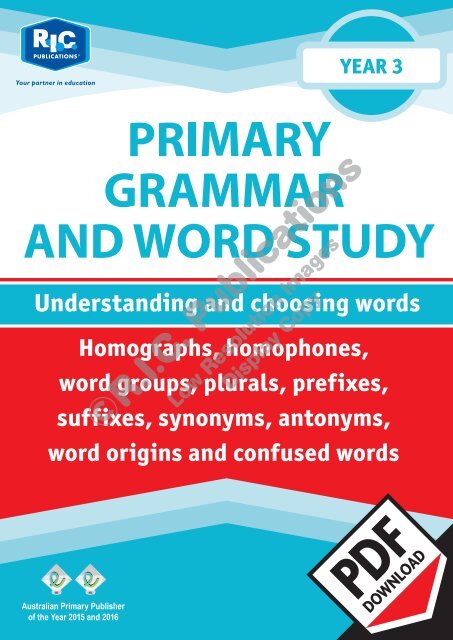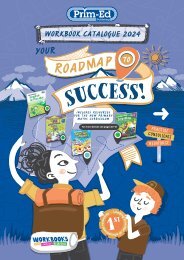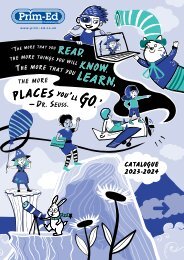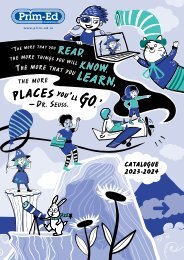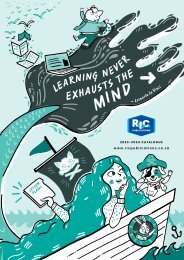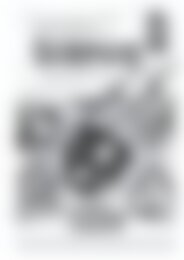RIC-20235 Primary Grammar and Word Study Year 3 – Understanding and choosing words
You also want an ePaper? Increase the reach of your titles
YUMPU automatically turns print PDFs into web optimized ePapers that Google loves.
©R.I.C. Publications<br />
Low Resolution Images<br />
Display Copy
<strong>Primary</strong> grammar <strong>and</strong> word study (Book D)<br />
Published by R.I.C. Publications ® 2008<br />
Copyright © by R.I.C. Publications ® 2008<br />
This master may only be reproduced by the<br />
original purchaser for use with their class(es). The<br />
publisher prohibits the loaning or onselling of this<br />
master for the purposes of reproduction.<br />
<strong>RIC</strong><strong>–</strong><strong>20235</strong><br />
Copyright Notice<br />
Blackline masters or copy masters are published <strong>and</strong><br />
sold with a limited copyright. This copyright allows<br />
publishers to provide teachers <strong>and</strong> schools with a<br />
wide range of learning activities without copyright<br />
being breached. This limited copyright allows the<br />
purchaser to make sufficient copies for use within<br />
their own education institution. The copyright is not<br />
transferable, nor can it be onsold. Following these<br />
instructions is not essential but will ensure that you,<br />
as the purchaser, have evidence of legal ownership<br />
to the copyright if inspection occurs.<br />
For your added protection in the case of copyright<br />
inspection, please complete the form below. Retain<br />
this form, the complete original document <strong>and</strong> the<br />
invoice or receipt as proof of purchase.<br />
Name of Purchaser:<br />
Date of Purchase:<br />
Supplier:<br />
School Order# (if applicable):<br />
Signature of Purchaser:<br />
©R.I.C. Publications<br />
Low Resolution Images<br />
Display Copy<br />
Internet websites<br />
In some cases, websites or specific URLs may be recommended. While these are checked <strong>and</strong> rechecked at the time of publication,<br />
the publisher has no control over any subsequent changes which may be made to webpages. It is strongly recommended that the class<br />
teacher checks all URLs before allowing students to access them.<br />
View all pages online<br />
PO Box 332 Greenwood Western Australia 6924<br />
Website: www.ricpublications.com.au<br />
Email: mail@ricgroup.com.au
<strong>Primary</strong> grammar <strong>and</strong><br />
word study <strong>–</strong> Book D<br />
Foreword<br />
<strong>Primary</strong> grammar <strong>and</strong> word study is a series of seven books designed<br />
to introduce students to parts of speech, ways to underst<strong>and</strong> <strong>and</strong> choose<br />
<strong>words</strong>, punctuation <strong>and</strong> figures of speech.<br />
Titles in this series:<br />
• <strong>Primary</strong> grammar <strong>and</strong> word study Book A (Ages 5<strong>–</strong> 6)<br />
• <strong>Primary</strong> grammar <strong>and</strong> word study Book B (Ages 6<strong>–</strong>7)<br />
• <strong>Primary</strong> grammar <strong>and</strong> word study Book C (Ages 7<strong>–</strong>8)<br />
• <strong>Primary</strong> grammar <strong>and</strong> word study Book D (Ages 8<strong>–</strong>9)<br />
• <strong>Primary</strong> grammar <strong>and</strong> word study Book E (Ages 9 <strong>–</strong>10)<br />
• <strong>Primary</strong> grammar <strong>and</strong> word study Book F (Ages 10<strong>–</strong>11)<br />
• <strong>Primary</strong> grammar <strong>and</strong> word study Book G (Ages 11<strong>–</strong>12)<br />
Teaches notes ................................................iv <strong>–</strong> v<br />
English curriculum links ....................................... v<br />
Literacy character explanation ...................... vi <strong>–</strong> vii<br />
Checklists.................................................... viii <strong>–</strong> xi<br />
Parts of speech .............................................. 2<strong>–</strong>33<br />
Nouns .............................................................. 2<strong>–</strong>5<br />
Verbs .............................................................. 6<strong>–</strong>11<br />
Adjectives..................................................... 12<strong>–</strong>17<br />
Adverbs ........................................................ 18<strong>–</strong>21<br />
Pronouns ...................................................... 22<strong>–</strong>25<br />
Conjunctions ................................................ 26<strong>–</strong>27<br />
Determiners ................................................. 28<strong>–</strong>31<br />
Prepositions ................................................. 32<strong>–</strong>33<br />
Underst<strong>and</strong>ing <strong>and</strong> <strong>choosing</strong> <strong>words</strong> ........... 34<strong>–</strong>57<br />
<strong>Word</strong>s that are similar ...............................34<strong>–</strong>41<br />
Homographs ............................................ 34<strong>–</strong>35<br />
Homophones ............................................ 36<strong>–</strong>37<br />
<strong>Word</strong> groups ............................................ 38<strong>–</strong>41<br />
<strong>Word</strong>s that change .....................................42<strong>–</strong>49<br />
Plurals ...................................................... 42<strong>–</strong>45<br />
Prefixes .................................................... 46<strong>–</strong>47<br />
Suffixes .................................................... 48<strong>–</strong>49<br />
Contents<br />
<strong>Word</strong>s <strong>and</strong> their meanings ........................50<strong>–</strong>57<br />
Synonyms ................................................ 50<strong>–</strong>51<br />
Antonyms ................................................. 52<strong>–</strong>53<br />
Confused <strong>words</strong> .........................................54<strong>–</strong>57<br />
Punctuation .................................................. 58<strong>–</strong>71<br />
Full stops, question marks <strong>and</strong><br />
exclamation marks ....................................... 58<strong>–</strong>59<br />
Capital letters ............................................... 60<strong>–</strong>61<br />
©R.I.C. Publications<br />
Low Resolution Images<br />
Display Copy<br />
Commas ....................................................... 62<strong>–</strong>65<br />
Apostrophes ................................................. 66<strong>–</strong>69<br />
Quotation marks ........................................... 70<strong>–</strong>71<br />
Figures of speech ......................................... 72<strong>–</strong>83<br />
Alliteration .................................................... 72<strong>–</strong>73<br />
Anagrams <strong>and</strong> palindromes .......................... 74<strong>–</strong>75<br />
Similes ......................................................... 76<strong>–</strong>77<br />
Metaphors .................................................... 78<strong>–</strong>79<br />
Onomatopoeia .............................................. 80<strong>–</strong>81<br />
Personification .............................................. 82<strong>–</strong>83<br />
R.I.C. Publications ® www.ricpublications.com.au iii<br />
<strong>Primary</strong> grammar <strong>and</strong> word study
Underst<strong>and</strong>ing <strong>and</strong> <strong>choosing</strong> <strong>words</strong><br />
checklist<br />
Name of student Homographs Homophones <strong>Word</strong> groups Plurals Prefixes Suffixes Synonyms Antonyms<br />
Confused<br />
<strong>words</strong><br />
©R.I.C. Publications<br />
Low Resolution Images<br />
Display Copy<br />
R.I.C. Publications ® www.ricpublications.com.au ix<br />
<strong>Primary</strong> grammar <strong>and</strong> word study
Underst<strong>and</strong>ing <strong>and</strong><br />
<strong>choosing</strong> <strong>words</strong><br />
Homographs<br />
Focus<br />
Homographs<br />
Definition<br />
• Homographs are <strong>words</strong> that are spelt the same but<br />
have different meanings.<br />
Example:<br />
light <strong>–</strong> the opposite of heavy<br />
light <strong>–</strong> pale in colour; e.g. light blue<br />
(Note: There are more than these two meanings for<br />
‘light’.)<br />
Sometimes homographs are pronounced differently.<br />
Example:<br />
tear (rhymes with deer)—a drop of water<br />
that falls from your eye; <strong>and</strong> tear (rhymes with<br />
dare)—to rip a page out of a book<br />
Explanation<br />
• Recognising <strong>and</strong> using different homographs<br />
develops <strong>and</strong> enriches students’ vocabulary. They<br />
learn to underst<strong>and</strong> the meaning <strong>and</strong> application of<br />
<strong>words</strong> <strong>and</strong> the way they work in print.<br />
Worksheet information<br />
• As an introduction, give two quiz questions to the<br />
students to demonstrate two different meanings for<br />
the same word.<br />
Example:<br />
Question 1: What is another word for a large<br />
stone? Question 2: What can you do with a baby<br />
in a cradle?<br />
Ask them to guess the word (rock) <strong>and</strong> discuss the<br />
different meanings. Students may suggest other<br />
meanings for ‘rock’, such as a type of music (rock<strong>and</strong>-roll).<br />
• Once completed, discuss the students’ answers for<br />
Question 1 as a class.<br />
• In Question 2, students are given one definition<br />
of various homographs. The answer is in the<br />
<strong>words</strong>earch. Once each homograph is found,<br />
students then write another meaning for each word<br />
on the lines provided. Dictionaries could be used to<br />
assist. Again, discuss students answers as a class as<br />
there are more than two meanings for many <strong>words</strong>.<br />
• The word ‘wind’ in 2. (d) is an example of a<br />
homograph that has different pronunciations.<br />
Discuss this with the students before they complete<br />
Question 3.<br />
Ideas for further practice<br />
• Students compile a class homograph dictionary<br />
for reference. Students brainstorm to list a specific<br />
number of <strong>words</strong> <strong>and</strong> arrange them in alphabetical<br />
order. A word can be written at the top of a page<br />
with two or more definitions underneath.<br />
• Hold a competition to see which group can come up<br />
with the most meanings for a homograph.<br />
Answers<br />
1. (a) Possible answer: A device for keeping you<br />
cool, such as a fan.<br />
(b) Possible answer: A piece of wood or metal<br />
used for support, such as a fence post.<br />
<strong>Primary</strong> grammar <strong>and</strong> word study 34<br />
www.ricpublications.com.au R.I.C. Publications ®<br />
2.<br />
c e a w b p g n o e<br />
o t h i g e r o p n<br />
n p i n e n e o s i<br />
e r i d u c k a l f<br />
u r n n r n a e l m<br />
©R.I.C. Publications<br />
Low Resolution Images<br />
Display Copy<br />
Possible answers:<br />
(a) a device for writing with<br />
(b) a score of zero in cricket/ to lower yourself<br />
down suddenly<br />
(c) a shape with a circular, flat bottom with<br />
sides that meet at the top with a point/the<br />
edible wafer of an ice-cream<br />
(d) to suddenly have shortness of breath/gas<br />
from the stomach or bowel<br />
(e) healthy or well/a monetary penalty paid for<br />
doing something wrong<br />
(f) jewellery worn on your fingers/a boxing ring<br />
(g) in a sloping position/to rest against<br />
something for support<br />
3. wind (rhymes with ‘kind’): to wind up a clock or<br />
similar/a track that turns one way then another
Homographs<br />
Some <strong>words</strong> are spelt the same way but have more than one<br />
meaning. They are called homographs.<br />
1. Each word has been written in a sentence to show one of its<br />
meanings. Use each word in another sentence to show another of its meanings.<br />
(a) fan: The football fan dressed up in his team’s colours.<br />
(b) post: I must remember to post her birthday card today.<br />
2. Read the definitions below <strong>and</strong> find each answer in the <strong>words</strong>earch. Write<br />
another meaning for each homograph on the lines provided.<br />
(a) Pigs are kept in this:<br />
(b) A bird that says ‘quack’:<br />
(c) Grows on a pine or fir tree:<br />
(d) Moving air:<br />
(e) Sunny without cloud:<br />
c e a s b p g n o e<br />
o t h i g e r o p n<br />
n w i n d n e o s i<br />
e r i d u c k a l f<br />
u r n n r n a e l m<br />
©R.I.C. Publications<br />
Low Resolution Images<br />
Display Copy<br />
(f) A circular shape:<br />
(g) A piece of meat with little or no fat:<br />
3. Write another meaning for ‘wind’ (rhymes with ‘kind’) on the back of this sheet.<br />
R.I.C. Publications ® www.ricpublications.com.au 35<br />
<strong>Primary</strong> grammar <strong>and</strong> word study
Underst<strong>and</strong>ing <strong>and</strong><br />
<strong>choosing</strong> <strong>words</strong><br />
Homophones<br />
Focus<br />
Homophones<br />
Definition<br />
• Homophones are <strong>words</strong> that sound the same but<br />
are spelt differently <strong>and</strong> have different meanings.<br />
Example:<br />
prey <strong>–</strong> an animal hunted for food by another<br />
pray <strong>–</strong> to plead with (God or an object of worship),<br />
to earnestly hope for something<br />
Explanation<br />
• The word ‘homophone’ means ‘same sound’.<br />
Homonyms (‘same name’) include both homophones<br />
<strong>and</strong> homographs (‘same writing’).<br />
• Identifying different homophones <strong>and</strong> recognising<br />
how to spell them helps students to communicate<br />
more clearly in writing. Investigating homophones<br />
also helps to develop <strong>and</strong> enrich students’<br />
vocabulary. They learn to underst<strong>and</strong> the meaning of<br />
<strong>words</strong> <strong>and</strong> the way they work in print.<br />
• Correct spelling is essential when using<br />
homophones. No spelling rules exist for spelling<br />
pairs or groups of homophones.<br />
Worksheet information<br />
• Read <strong>and</strong> discuss the definition with the students. If<br />
desired, tell them the meaning of ‘homo’ <strong>and</strong> ‘phone’<br />
to help them remember the difference between<br />
homophones <strong>and</strong> homographs. Give, <strong>and</strong> ask for,<br />
some suggestions of <strong>words</strong> which are homophones.<br />
List these on the board.<br />
• Before asking the students to read the text to<br />
answer Question 1, remind them that the correct<br />
<strong>words</strong> have been used, but with incorrect spelling<br />
which gives each word a different meaning.<br />
• There are 17 incorrect spellings (incorrect<br />
homophones) to be circled in the text. Correct these<br />
as a class before allowing students to write the<br />
correct homophone above each. Then ask students<br />
to reread the text when completed to see if it makes<br />
more sense than the previous version.<br />
• Students should be able to complete Questions 2<br />
<strong>and</strong> 3 independently.<br />
Ideas for further practice<br />
• Think of some well-known sayings, songs, poems or<br />
rhymes that contain homophones, such as ‘A sailor<br />
went to sea, sea, sea to see what he could see, see,<br />
see …’ or ‘How much wood would a woodchuck<br />
chuck if a woodchuck could chuck wood?’<br />
• Homophones make eye-catching names for shops.<br />
Example:<br />
‘Fish Plaice’ (fish <strong>and</strong> chip shop—’plaice’ is a<br />
species of fish ), ‘Sew Fantastic’ (sewing <strong>and</strong><br />
material shop), ‘Home Suite Home’ <strong>and</strong> ‘Suite<br />
Dreams’ (furniture shops), ‘Meat at the Corner’<br />
(butcher shops).<br />
Use a local phone book to locate others to share<br />
with the class.<br />
• Students write a fun sentence or rhyme which<br />
helps them remember how to differentiate between<br />
homophones; for example: beech/beach—‘A beech<br />
is a tree but the beach is by the sea’ or ‘Wait here<br />
while I check the weight of the elephant’.<br />
Answers<br />
1.<strong>–</strong>2. Tom<br />
We finally made it to the airport despite Dad<br />
stressing the whole time. We were a whole hour<br />
early, so we had to wait around for ages being<br />
bored. The plane that we caught seemed huge,<br />
but by the time everyone was on board there<br />
wasn’t a lot of room to move around in. We rode<br />
in a taxi to the hotel <strong>and</strong> were really tired when<br />
we got here. Tomorrow, we are going to visit the<br />
berry farm <strong>and</strong> I hope we can have scones with<br />
cream <strong>and</strong> jam again, like we had before. It’s past<br />
my bedtime now, so I will write again soon.<br />
©R.I.C. Publications<br />
Low Resolution Images<br />
Display Copy<br />
Your best friend<br />
Warren<br />
3. (a) prey (b) rode, road (c) bear<br />
(d) flower (e) their, there (f) drawer<br />
4. Teacher check<br />
<strong>Primary</strong> grammar <strong>and</strong> word study 36<br />
www.ricpublications.com.au R.I.C. Publications ®
Homophones<br />
Homophones are <strong>words</strong> that sound the same but are spelt<br />
differently <strong>and</strong> have different meanings.<br />
1. (a) Read the email below <strong>and</strong> underline the <strong>words</strong> used incorrectly.<br />
Inbox (25 messages)<br />
Get Mail Delete Junk Reply Reply All Forward New Message Note To Do Search<br />
MAILBOXES<br />
Mailbox<br />
Sent<br />
Trash<br />
ON MY COMPUTER<br />
Spike<br />
Stacy Y<br />
Malaika Q<br />
Jack O<br />
Gordon D<br />
Pete F<br />
M<strong>and</strong>y S<br />
Noah H<br />
(b) Write the correct word above each incorrect one.<br />
2. Write a homophone for each word.<br />
(a) pray<br />
(c) bare<br />
(e) they’re<br />
Tom<br />
From Subject Date Received<br />
Warren Tran Nguyen To the airport on time! Saturday 5 December<br />
Noah Jordan Annika’s going to the party! Saturday 5 December<br />
M<strong>and</strong>y Gordon Are you going to Mike’s party? Saturday 5 December<br />
We finally maid it to the airport despite Dad stressing the hole time. We were a<br />
hole our early, so we had to weight around for ages being board. The plain that<br />
we court seemed huge, but buy the time everyone was on bored their wasn’t a<br />
lot of room to move around in. We road in a taxi to the hotel <strong>and</strong> were really tired<br />
when we got hear. Tomorrow, we are going to visit the bury farm <strong>and</strong> I hope we<br />
can have scones with cream <strong>and</strong> jam again, like we had before. It’s passed my<br />
bedtime now, sew I will right again soon.<br />
Your best friend<br />
Warren<br />
(b) rowed<br />
©R.I.C. Publications<br />
Low Resolution Images<br />
Display Copy<br />
(d) flour<br />
(f) draw<br />
Homophones are good to use for making jokes.<br />
3. Read the jokes below, then write a similar joke of your own on the back of this<br />
sheet.<br />
(a) There was a lady who wore a size 16 dress. When she was younger, she wore a<br />
much smaller size.<br />
Question: Why do you think she now wears a size 16 dress?<br />
Answer: Because she eight <strong>and</strong> eight. (8 + 8) (ate <strong>and</strong> ate)<br />
(b) Question: Why are you lying around like that, doing nothing?<br />
Answer: Because I am (a) board. (bored)<br />
R.I.C. Publications ® www.ricpublications.com.au 37<br />
<strong>Primary</strong> grammar <strong>and</strong> word study
Underst<strong>and</strong>ing <strong>and</strong><br />
<strong>choosing</strong> <strong>words</strong><br />
<strong>Word</strong> groups<br />
Focus<br />
Alphabetical order<br />
Explanation<br />
• Alphabetical order is a system used to arrange<br />
items so they can be easily found. It is used in many<br />
ways with which students are familiar, such as class<br />
registers, dictionaries <strong>and</strong> libraries.<br />
• Initially, <strong>words</strong> are ordered by the first letter, then the<br />
second, third <strong>and</strong> so on.<br />
Worksheet information<br />
• Prior to completing the sheet, show students<br />
examples of how alphabetical order is used in daily<br />
life, such as street names in road books, names in<br />
telephone directories <strong>and</strong> indexes at the back of<br />
books.<br />
• Give students short lists of related <strong>words</strong> to place in<br />
alphabetical order, explaining that if there are two<br />
or more <strong>words</strong> beginning with the same letter, the<br />
ordering is by the second, third etc. letter.<br />
• In Question 1, students order the South American<br />
countries from 1 (Argentina) to 12 (Venezuela).<br />
• In Question 2, students rearrange the letters to find<br />
the six sports <strong>and</strong> then place them on the puzzle.<br />
Counting the number of letters in each word can be<br />
offered as a clue if necessary. The boxes are then<br />
numbered as in Question 1.<br />
Ideas for further practice<br />
• Make several lists of <strong>words</strong> for students to place<br />
in alphabetical order by first, second or third letter<br />
or a mixture of all three. Choose subjects that are<br />
of some interest to the students such as sports, TV<br />
programs, popular authors <strong>and</strong> local suburbs.<br />
• Students find synonyms <strong>and</strong> antonyms of a selection<br />
of <strong>words</strong> <strong>and</strong> place them in alphabetical order.<br />
• Challenge students to be the first to find <strong>words</strong> in a<br />
dictionary, street names in a map book or telephone<br />
numbers in a telephone directory.<br />
Answers<br />
1. 1. Argentina 2. Bolivia<br />
3. Brazil 4. Chile<br />
5. Colombia 6. Ecuador<br />
7. Guyana 8. Paraguay<br />
9. Peru 10. Suriname<br />
11. Uruguay 12. Venezuela<br />
2. (a) (i) squash<br />
(ii) tennis<br />
(iii) rowing<br />
(iv) swimming<br />
(v) netball<br />
(vi) rugby<br />
(b) (c)<br />
©R.I.C. Publications<br />
Low Resolution Images<br />
Display Copy<br />
<strong>Primary</strong> grammar <strong>and</strong> word study 38<br />
www.ricpublications.com.au R.I.C. Publications ®
Alphabetical order<br />
Alphabetical order is an effective way to organise all sorts of<br />
information so it can be found easily.<br />
a b c d e f g h i j k l m n o p q r s t u v w x y z<br />
1. Number the boxes from 1 to 12 to arrange the countries in alphabetical order.<br />
P A R A G U A Y C O L O M B I A<br />
2. (a) Rearrange the letters in each word to reveal the names of six sports.<br />
(i) auhqss<br />
(iii) iognrw<br />
(v) aebllnt<br />
(b) Place each sport on the puzzle.<br />
(ii) einnst<br />
(iv) gimminsw<br />
(vi) ubgry<br />
(c) Number the boxes to arrange the sports in alphabetical order.<br />
S<br />
C U R U G U A Y<br />
A H R A<br />
R I B O L I V I A N<br />
G L N A<br />
V E N E Z U E L A B<br />
N M R<br />
T P E C U A D O R<br />
I E Z<br />
N R I<br />
©R.I.C. Publications<br />
Low Resolution Images<br />
Display Copy<br />
G<br />
U<br />
R.I.C. Publications ® www.ricpublications.com.au 39<br />
<strong>Primary</strong> grammar <strong>and</strong> word study
Underst<strong>and</strong>ing <strong>and</strong><br />
<strong>choosing</strong> <strong>words</strong><br />
<strong>Word</strong> groups<br />
Focus<br />
The names of different occupations<br />
Explanation<br />
• Occupations can be categorised in many ways.<br />
Example:<br />
trades <strong>–</strong> electrician, plasterer, plumber, builder,<br />
gardener<br />
health <strong>–</strong> doctor, dentist<br />
protection <strong>–</strong> police, firefighter<br />
personal <strong>–</strong> hairdresser, fitness instructor<br />
• Occupations can also be categorised by the name of<br />
what they study.<br />
Example:<br />
speleologist (speleology)<br />
palaeontologist (palaeontology)<br />
Worksheet information<br />
• Note that each pair of occupations has a different<br />
word ending.<br />
• Students find the <strong>words</strong> in the <strong>words</strong>earch. The<br />
<strong>words</strong> can be found vertically, horizontally <strong>and</strong><br />
diagonally <strong>and</strong> can be written backwards or<br />
forwards.<br />
• Students write a definition for each given occupation<br />
in Question 2.<br />
• Students add an occupation to each word group <strong>and</strong><br />
write a definition.<br />
Ideas for further practice<br />
• Make a list of occupations of people who work in a<br />
particular environment, such as the school, a leisure<br />
centre, a restaurant or a shopping centre.<br />
• Conduct a survey to determine the occupations of<br />
the students’ parents <strong>and</strong> occupations the students<br />
would like to have in the future.<br />
Answers<br />
1.<br />
N R O T A R T S U L L I<br />
A A I G G F R Z N P R M<br />
I A I P E E E A H A E A<br />
R M U R Y O I U U Z B G<br />
A Y A W O C L D V E M I<br />
R D A N I T I O Y V U C<br />
B L Z T S T S S G Y L I<br />
I T E G O M O I H I P A<br />
L I U R B R R N H H S N<br />
D Z O O L O G I S T Z T<br />
2. (a) (i) auditor <strong>–</strong> checks reliability of information<br />
illustrator <strong>–</strong> produces art to enhance<br />
writing<br />
(ii) historian <strong>–</strong> researches past events<br />
librarian <strong>–</strong> organises information in a<br />
library<br />
(iii) dietician <strong>–</strong> gives advice on food <strong>and</strong><br />
nutrition<br />
magician <strong>–</strong> performs seemingly impossible<br />
tricks<br />
(iv) zoologist <strong>–</strong> studies all aspects of animals<br />
geologist <strong>–</strong> studies the physical structure<br />
of the planet<br />
©R.I.C. Publications<br />
Low Resolution Images<br />
Display Copy<br />
(v) plumber <strong>–</strong> instals <strong>and</strong> maintains pipe<br />
systems<br />
lawyer <strong>–</strong> a person with an underst<strong>and</strong>ing<br />
of the law<br />
(b) Teacher check.<br />
Answers could include:<br />
(i) censor, editor, inventor, janitor, sailor,<br />
sculptor, tutor, translator, surveyor<br />
(ii) musician, statistician, technician, mortician,<br />
mathematician<br />
(iii) paediatrician, electrician, physician,<br />
veterinarian<br />
(iv) cartoonist, dentist, chemist, scientist,<br />
psychologist, journalist, machinist<br />
(v) boilermaker, diver, cleaner, engineer,<br />
gardener, hairdresser, director, designer<br />
<strong>Primary</strong> grammar <strong>and</strong> word study 40<br />
www.ricpublications.com.au R.I.C. Publications ®
Occupations<br />
1. Find the <strong>words</strong> from the box in the <strong>words</strong>earch.<br />
N R O T A R T S U L L I<br />
A A I G G F R Z N P R M<br />
I A I P E E E A H A E A<br />
R M U R Y O I U U Z B G<br />
A Y A W O C L D V E M I<br />
R D A N I T I O Y V U C<br />
B L Z T S T S S G Y L I<br />
I T E G O M O I H I P A<br />
L I U R B R R N H H S N<br />
D Z O O L O G I S T Z T<br />
2. (a) Use a dictionary to find <strong>and</strong> write the definition of each occupation.<br />
(b) Add another occupation with the same word ending to each group <strong>and</strong> write its<br />
definition.<br />
(i) auditor<br />
illustrator<br />
(ii) historian<br />
librarian<br />
(iii) dietician<br />
magician<br />
auditor<br />
historian<br />
dietician<br />
zoologist<br />
plumber<br />
illustrator<br />
librarian<br />
magician<br />
geologist<br />
lawyer<br />
©R.I.C. Publications<br />
Low Resolution Images<br />
Display Copy<br />
(iv) zoologist<br />
geologist<br />
(v) plumber<br />
lawyer<br />
R.I.C. Publications ® www.ricpublications.com.au 41<br />
<strong>Primary</strong> grammar <strong>and</strong> word study
Underst<strong>and</strong>ing <strong>and</strong><br />
<strong>choosing</strong> <strong>words</strong><br />
Plurals<br />
Focus<br />
Plurals:<br />
Irregular plurals:<br />
Definition<br />
adding s or es<br />
<strong>words</strong> ending in is changing to es<br />
<strong>words</strong> always in the plural form<br />
• A plural is a word used to indicate more than one.<br />
Example:<br />
three apples, three brushes<br />
Explanation<br />
• ‘Singular’ means one. ‘Plural’ means more than one.<br />
• There are many ways to form the plural of a word.<br />
• To form the plural of most nouns, we just add an s.<br />
• To form the plural of <strong>words</strong> ending in sh, ch, s <strong>and</strong><br />
x, we add es to make the word easier to pronounce.<br />
• To form the plural of some <strong>words</strong>, the word ending<br />
changes.<br />
Example:<br />
one crisis <strong>–</strong> many crises<br />
• Some <strong>words</strong> have the same form whether the word<br />
is singular or plural.<br />
Example:<br />
one pair of glasses <strong>–</strong> many pairs of glasses<br />
• It is important students realise that there are many<br />
exceptions to most spelling rules. They should be<br />
encouraged to identify exceptions <strong>and</strong> to share them<br />
with the class.<br />
Worksheet information<br />
• Students may be unfamiliar with some terms used<br />
on this worksheet. If possible, have the equipment<br />
available for students to see. Have them guess the<br />
name of each piece.<br />
• Discuss each rule <strong>and</strong> share further examples with<br />
students. Record all shared information.<br />
Ideas for further practice<br />
• Create a class list of types of jobs. Students then<br />
research to find out the type of equipment <strong>and</strong><br />
any special terms related to each job. Record the<br />
singular <strong>and</strong> plural form of each.<br />
Answers<br />
1. Add s: drills, hammers, spanners, screwdrivers,<br />
spirit levels<br />
Add es: metal presses, winches, toolboxes,<br />
wrenches, wire brushes<br />
2. axes: mathematician; diagnoses: vet, doctor,<br />
dentist; hypotheses: scientist; theses: university<br />
student, lecturer<br />
3.<br />
t o n g s a s<br />
w s b c r e c<br />
e f e l u k i<br />
e p l i e r s<br />
z p l p t l s<br />
e s o p a v o<br />
r x w e c s r<br />
s t s r e d s<br />
g l a s s e s<br />
©R.I.C. Publications<br />
Low Resolution Images<br />
Display Copy<br />
<strong>Primary</strong> grammar <strong>and</strong> word study 42<br />
www.ricpublications.com.au R.I.C. Publications ®
Plurals <strong>–</strong> 1<br />
Plural means ‘more than one’. Most nouns are made plural<br />
by adding s. Nouns ending in ch, sh, s or x are made plural by<br />
adding es to make them easier to say.<br />
1. Workers use many different types of<br />
equipment. Sort the equipment listed<br />
below under the correct headings in<br />
the table. Write each word in its plural<br />
form.<br />
metal press<br />
drill<br />
winch<br />
hammer<br />
toolbox<br />
spanner<br />
wrench<br />
screwdriver<br />
wire brush<br />
spirit level<br />
Many nouns ending in is<br />
change to es when plural.<br />
2. Write the plural form of these <strong>words</strong>,<br />
then find out who might use each<br />
word in their job.<br />
axis<br />
Who?<br />
Plural:<br />
Add s<br />
Add es<br />
Some nouns are written in the plural form <strong>and</strong><br />
stay the same whether they are singular or plural.<br />
3. Find the eight hidden tool names<br />
which stay written the same way.<br />
t o n g s a s<br />
©R.I.C. Publications<br />
Low Resolution Images<br />
Display Copy<br />
w s b c r e c<br />
diagnosis<br />
Who?<br />
hypothesis<br />
Who?<br />
thesis<br />
Who?<br />
Plural:<br />
Plural:<br />
Plural:<br />
e f e l u k i<br />
e p l i e r s<br />
z p l p t l s<br />
e s o p a v o<br />
r x w e c s r<br />
s t s r e d s<br />
g l a s s e s<br />
R.I.C. Publications ® www.ricpublications.com.au 43<br />
<strong>Primary</strong> grammar <strong>and</strong> word study
Underst<strong>and</strong>ing <strong>and</strong><br />
<strong>choosing</strong> <strong>words</strong><br />
Plurals<br />
Focus<br />
Plurals:<br />
Definition<br />
<strong>words</strong> ending with a vowel followed by y<br />
<strong>words</strong> ending with fe<br />
<strong>words</strong> ending with a vowel followed by o<br />
• A plural is a word used to indicate more than one.<br />
Example:<br />
six giraffes, six boxes<br />
Explanation<br />
• ‘Singular’ means one. ‘Plural’ means more than one.<br />
• There are many ways to form the plural of a word.<br />
• To form the plural of <strong>words</strong> ending in a vowel <strong>and</strong> y,<br />
add s.<br />
Example:<br />
key <strong>–</strong> keys<br />
• To form the plural of <strong>words</strong> ending in fe, change the<br />
f to v <strong>and</strong> add s.<br />
Example:<br />
wife <strong>–</strong> wives<br />
• To form the plural of <strong>words</strong> ending in a vowel <strong>and</strong> o,<br />
add s.<br />
Example:<br />
radio <strong>–</strong> radios<br />
• It is important students realise that there are many<br />
exceptions to most spelling rules. They should be<br />
encouraged to identify exceptions <strong>and</strong> to share them<br />
with the class.<br />
Worksheet information<br />
• Discuss each rule <strong>and</strong> share similar examples with<br />
students. Record all shared information.<br />
Ideas for further practice<br />
• Talk about holiday activities <strong>and</strong> things students<br />
might take on holiday. Sort them into categories<br />
according to how the <strong>words</strong> are made plural.<br />
Answers<br />
1. (a) holidays (b) boys (c) monkeys<br />
(d) valleys (e) toys (f) trays<br />
2.<br />
1.<br />
2.<br />
5.<br />
6.<br />
K A N G A R O O S<br />
N<br />
3. 4.<br />
I W I V E S<br />
V<br />
E<br />
S T E R E O S<br />
I<br />
D<br />
O<br />
L I V E S<br />
©R.I.C. Publications<br />
Low Resolution Images<br />
Display Copy<br />
Z<br />
O<br />
<strong>Primary</strong> grammar <strong>and</strong> word study 44<br />
www.ricpublications.com.au R.I.C. Publications ®
Plurals <strong>–</strong> 2<br />
Plural means more than one. A word ending in a vowel followed<br />
by y can be made plural by adding s.<br />
1. Write the plural of each of these <strong>words</strong> to complete the sentences.<br />
monkey valley holiday tray toy boy<br />
(a) We are spending our<br />
to do there.<br />
(b) The<br />
beach.<br />
(c) We saw plenty of<br />
(d) There are heaps of hills <strong>and</strong><br />
(e) My younger brothers take lots of<br />
car.<br />
(f) The waiters in the restaurant use<br />
in the south-west. There is so much<br />
are going to spend time fishing while the girls go to the<br />
at the zoo.<br />
When a word ends in a vowel followed by o—just add s.<br />
When a word ends in fe—change the f to v, then add s.<br />
2. Use the clues to help you complete the crossword.<br />
Across<br />
2. jumping marsupials<br />
3. the partners of husb<strong>and</strong>s<br />
5. devices used to listen to<br />
music<br />
6. the plural of life<br />
2.<br />
to explore while on holiday.<br />
to play with while in the<br />
to carry our meals.<br />
©R.I.C. Publications<br />
Low Resolution Images<br />
Display Copy<br />
3. 4.<br />
1.<br />
Down<br />
1. places where people go to<br />
view animals in enclosures<br />
2. cutting tools<br />
4. filmed memories<br />
5.<br />
6.<br />
R.I.C. Publications ® www.ricpublications.com.au 45<br />
<strong>Primary</strong> grammar <strong>and</strong> word study
Underst<strong>and</strong>ing <strong>and</strong><br />
<strong>choosing</strong> <strong>words</strong><br />
Prefixes<br />
Focus<br />
Prefixes: un, re <strong>and</strong> tri<br />
Definition<br />
• A prefix is a letter or group of<br />
letters added to the beginning of a<br />
word to alter its meaning <strong>and</strong> form<br />
a new word.<br />
Example:<br />
Michael was unhappy about<br />
having to rewrite his homework.<br />
Explanation<br />
• A prefix is a word part that has a<br />
meaning of its own, <strong>and</strong> is often<br />
derived from Greek or Latin.<br />
Prefixes usually do not occur as<br />
independent <strong>words</strong>. The prefix is<br />
added to the front of a base word<br />
to change its meaning, without<br />
changing the spelling of that word.<br />
Sometimes a hyphen is placed<br />
between the prefix <strong>and</strong> the base (or<br />
root) word, such as:<br />
<strong>–</strong> when prefixes come before<br />
proper nouns<br />
Example:<br />
un-Australian, anti-American<br />
<strong>–</strong> when prefixes ending in a or i<br />
are added to a word that begins<br />
with the same letter<br />
Example:<br />
ultra-ambitious<br />
<strong>–</strong> when the prefix is ex or self,<br />
except for selfish <strong>and</strong> selfless.<br />
Example:<br />
ex-husb<strong>and</strong>, self-centred<br />
• Ensure students learn to be aware<br />
of letter clusters that look like<br />
prefixes, but aren’t.<br />
Example:<br />
un in uncle, in in invented<br />
Students can practise identifying<br />
these ‘trick’ prefixes by looking at<br />
the base or root word that is left.<br />
The prefixes that cause the most<br />
difficulty are re, in, <strong>and</strong> dis.<br />
• Learning the meanings of prefixes<br />
can help students decipher, spell<br />
<strong>and</strong> underst<strong>and</strong> <strong>words</strong>, especially<br />
larger <strong>words</strong>, <strong>and</strong> increase their<br />
vocabulary. Underst<strong>and</strong>ing that the<br />
spelling of neither the prefix nor the<br />
base word change can help students<br />
to spell commonly misspelled <strong>words</strong><br />
such as unnecessary, misspell <strong>and</strong><br />
disappointment.<br />
• un is a negative prefix which often<br />
comes before adjectives;<br />
Example:<br />
unsafe, unable, unclean, unequal<br />
in participles used as adjectives;<br />
Example:<br />
unfeeling, unflinching, unfinished,<br />
unsaid<br />
or sometimes before nouns.<br />
Example:<br />
unbelief, unconcern<br />
• un has a number of meanings:<br />
<strong>–</strong> not<br />
Example:<br />
unhappy, unfaithful<br />
<strong>–</strong> opposite of<br />
Example:<br />
unrest<br />
<strong>–</strong> <strong>and</strong> to reverse or undo the result<br />
of an action.<br />
Example:<br />
unlock, unwrap<br />
• re is usually added to verbs <strong>and</strong> can<br />
mean back.<br />
Example:<br />
rewind<br />
<strong>–</strong> re is usually added to verbs <strong>and</strong><br />
can also mean again.<br />
Example:<br />
regroup, resurface<br />
<strong>–</strong> or to do something in a new way.<br />
Example:<br />
reword<br />
• tri means three.<br />
Example:<br />
triceratops (three horns), triathlon<br />
Worksheet information<br />
• By completing the worksheet activity,<br />
students will discover for themselves<br />
the meaning of the prefixes un, tri <strong>and</strong><br />
re. They will need scissors <strong>and</strong> access<br />
to a dictionary for this activity.<br />
• Students can work in small groups,<br />
ideally of three or four, <strong>and</strong> require<br />
only one worksheet per group,<br />
preferably photocopied onto white<br />
card. Students cut <strong>words</strong>, then play<br />
a concentration-style game, turning<br />
two cards over at a time to try<br />
<strong>and</strong> correctly match prefixes with<br />
<strong>words</strong>. Those they match should<br />
be written down <strong>and</strong> the meaning<br />
found in a dictionary or online.<br />
(Each student should have three<br />
or four <strong>words</strong>. If they have more<br />
or less, ask the group members to<br />
distribute the <strong>words</strong> evenly in the<br />
group.) As a group, the students<br />
then decide upon a definition for<br />
the prefix, write it on a separate<br />
sheet of paper <strong>and</strong> present to the<br />
class.<br />
• As a follow-up activity, give each<br />
student a card containing either<br />
a prefix or a root word. Students<br />
must find the person with a prefix<br />
or word to match theirs to make<br />
a word with a new meaning. After<br />
pairing up with that person, the<br />
students agree upon a sentence<br />
that demonstrates their knowledge<br />
of the word’s meaning.<br />
Ideas for further<br />
practice<br />
• has a number of interactive<br />
games involving matching prefixes<br />
to their meaning.<br />
• Students can use <strong>words</strong> with<br />
prefixes to make a crossword<br />
puzzle at .<br />
©R.I.C. Publications<br />
Low Resolution Images<br />
Display Copy<br />
Answers<br />
un: unlikely, unhappy, unpick, untie<br />
re: refresh, retell, review, rewrite,<br />
tri: tricycle, tripod, triweekly, triangle<br />
<strong>Primary</strong> grammar <strong>and</strong> word study 46<br />
www.ricpublications.com.au R.I.C. Publications ®
Prefixes<br />
Prefixes are groups of letters in front of a word that change its<br />
meaning <strong>and</strong> create a new word.<br />
Match the <strong>words</strong> <strong>and</strong> prefixes, then find the meanings of the new <strong>words</strong>.<br />
What do the prefixes un, re <strong>and</strong> tri mean?<br />
un re un<br />
tri re tri<br />
re tri un<br />
likely tell happy<br />
write pick tri<br />
©R.I.C. Publications<br />
Low Resolution Images<br />
Display Copy<br />
re un view<br />
cycle angle weekly<br />
fresh tie pod<br />
R.I.C. Publications ® www.ricpublications.com.au 47<br />
<strong>Primary</strong> grammar <strong>and</strong> word study
Underst<strong>and</strong>ing <strong>and</strong><br />
<strong>choosing</strong> <strong>words</strong><br />
Suffixes<br />
Focus<br />
Suffixes: ness, ment, less <strong>and</strong> ful<br />
Definition<br />
• A suffix is a letter or group of letters added to the<br />
end of a base word to change its meaning <strong>and</strong> form<br />
a new word.<br />
Explanation<br />
• The suffixes used in this exercise do not usually<br />
change the spelling of the base word <strong>and</strong> are a good<br />
starting point for learning about suffixes.<br />
• The suffix less usually changes a noun to an<br />
adjective <strong>and</strong> means ‘free from’ or ‘without’. When<br />
less is added to some verbs, such as ‘count’ <strong>and</strong><br />
‘harm’, it means the action ‘can’t be done’.<br />
• The suffix ful means something is ‘full of’ or<br />
‘characterised by something’.<br />
• The suffix ness means ‘a state or quality of being’. It<br />
often converts adjectives to nouns.<br />
• The suffix ment means ‘an action or process’.<br />
• When ness, ful <strong>and</strong> less are added to <strong>words</strong> ending<br />
in y, the y is often changed to i.<br />
Example:<br />
merciless, cleanliness, clumsiness, bodiless, dutiful,<br />
beautiful, pitiful, fanciful<br />
Exceptions include ‘joyful’ <strong>and</strong> ‘playful’.<br />
• Knowing the meanings of common suffixes can<br />
help students work out the meaning of unfamiliar<br />
<strong>words</strong>. A sound knowledge of suffixes can also help<br />
students spell correctly <strong>and</strong> develop their vocabulary.<br />
An underst<strong>and</strong>ing of suffixes can, furthermore, help<br />
students identify which part of speech (noun, verb,<br />
adjective, adverb) a word belongs to.<br />
Worksheet information<br />
• Discuss suffixes with the students. Explain they are<br />
word parts at the end of some <strong>words</strong> <strong>and</strong> that when<br />
these word parts are added to a word, they change<br />
the meaning of the word, creating a new word. Also,<br />
we are better able to underst<strong>and</strong> or spell new <strong>words</strong><br />
if we can recognise <strong>and</strong> underst<strong>and</strong> the meaning of<br />
suffixes.<br />
• Read the suffix definitions with the students. They<br />
then draw a line from the base <strong>words</strong> on the left to<br />
the suffixes on the right to form a new word.<br />
• Students then use the definitions provided in the<br />
boxes at the top of the worksheet to write definitions<br />
for the <strong>words</strong> they made in Question 2. Students<br />
may need dictionaries to check the <strong>words</strong> they have<br />
made are ‘real’ <strong>words</strong>.<br />
Ideas for further practice<br />
• Call out one of the suffixes. Students try to write as<br />
many <strong>words</strong> that end with that suffix during a set<br />
time period.<br />
• Write a list of <strong>words</strong> containing the focus suffixes<br />
on the board. Make a small number of cards with<br />
these <strong>words</strong>. One at a time, students take a card <strong>and</strong><br />
mime the word. The other students try to guess the<br />
word the student is acting out.<br />
• Ask students to list some current songs with any of<br />
the above suffixes in the lyrics.<br />
©R.I.C. Publications<br />
Low Resolution Images<br />
Display Copy<br />
Answers<br />
2. ageless, useful/useless, careful/careless, madness,<br />
payment, hopeless/hopeful, movement.<br />
3. Teacher check. Answers will vary but definitions<br />
should include some of the <strong>words</strong> used in the<br />
suffix descriptions at the top of the worksheet.<br />
<strong>Primary</strong> grammar <strong>and</strong> word study 48<br />
www.ricpublications.com.au R.I.C. Publications ®
Sticky suffixes<br />
A suffix is a letter or group of letters added to the end of a word<br />
to make a new word.<br />
1. Read the definitions of these four common suffixes.<br />
ness<br />
ment<br />
2. Match each base word to a suffix to form a new word.<br />
(a) age • • less<br />
(b) use • • less<br />
(c) care • • ment<br />
(d) mad • • ness<br />
(e) pay • • ful<br />
(f) hope • • ful<br />
(g) move • • ment<br />
3. List the new <strong>words</strong> you made, then write a definition for each. Use the suffix<br />
definitions in the boxes above to help.<br />
(a)<br />
(b)<br />
(c)<br />
(d)<br />
(e)<br />
(f)<br />
(g)<br />
‘The state of being something’;<br />
e.g. laziness is ‘the state of being lazy’,<br />
happiness is ‘the state of being happy’.<br />
ful<br />
‘Full of’ or ‘filled’;<br />
e.g. helpful means ‘full of help’,<br />
beautiful means ‘full of beauty’.<br />
Note: When full is a suffix, it has one l.<br />
‘Action’ or ‘process of’;<br />
e.g. enjoyment is ‘the act of enjoying’,<br />
amazement is ‘the act of being amazed’.<br />
R.I.C. Publications ® www.ricpublications.com.au 49<br />
<strong>Primary</strong> grammar <strong>and</strong> word study<br />
less<br />
‘Without’ or ‘can’t be done’;<br />
e.g. endless means ‘without end’,<br />
fearless means ‘without fear’.<br />
©R.I.C. Publications<br />
Low Resolution Images<br />
Display Copy
Underst<strong>and</strong>ing <strong>and</strong><br />
<strong>choosing</strong> <strong>words</strong><br />
Synonyms<br />
Focus<br />
Synonyms<br />
Definition<br />
• Synonyms are <strong>words</strong> that have the same or similar<br />
meaning.<br />
Example:<br />
magnificent <strong>–</strong> fantastic <strong>–</strong> wonderful<br />
Note: The choice of each synonym depends on the<br />
context the word is used. We would probably say<br />
that we had a ‘fantastic’ or ‘wonderful’ time rather<br />
than a ‘magnificent’ time.<br />
Explanation<br />
• Identifying <strong>and</strong> using different synonyms develops<br />
<strong>and</strong> enriches students’ vocabulary. Varying<br />
vocabulary use of appropriate synonyms enhances<br />
their written <strong>and</strong> verbal communication.<br />
Worksheet information<br />
• Ask students how they would feel if they heard a<br />
strange noise outside their bedroom window. Ask<br />
them for <strong>words</strong> to describe these feelings.<br />
Example:<br />
scared, frightened, afraid, spooked<br />
Explain how these <strong>words</strong> are similar <strong>and</strong> are called<br />
synonyms <strong>and</strong> have the same or almost the same<br />
meaning.<br />
• Discuss each part of the worksheet with the<br />
students. They can complete it independently or with<br />
teacher assistance as necessary. If they are having<br />
difficulty in finding the <strong>words</strong> in Activity 1, give them<br />
the first letter as a clue, then the second etc. Discuss<br />
the different synonyms students choose. Students<br />
may need dictionaries or thesauruses to complete<br />
Activity 2.<br />
• Discuss different synonyms students may have<br />
chosen for the activity <strong>and</strong> if all were appropriate for<br />
the context in which they were used.<br />
Ideas for further practice<br />
• Give students an example paragraph in which a<br />
word is repeated.<br />
Example:<br />
‘Last Sunday was a great day. We all had a great<br />
time at the fun park. All the rides were great,<br />
especially the Giant Slalom.’<br />
Students rewrite the paragraph using synonyms for<br />
‘great’ so the paragraph still retains its meaning <strong>and</strong><br />
is more interesting with varied vocabulary.<br />
• Give students crossword puzzles as these often<br />
require students to think of synonyms for answers.<br />
• Hold a ‘synonym relay’. Teams of students have<br />
turns at writing synonyms for a nominated word.<br />
Thesauruses could be used. After a set time, check<br />
to see which team has written the most correct<br />
synonyms.<br />
Answers<br />
1. <strong>Word</strong>s clockwise from top left (possible synonyms<br />
listed):<br />
unkind <strong>–</strong> mean/nasty<br />
chair <strong>–</strong> seat/bench<br />
tired <strong>–</strong> sleepy/weary<br />
untidy <strong>–</strong> messy/cluttered<br />
delight <strong>–</strong> joy/happiness<br />
©R.I.C. Publications<br />
Low Resolution Images<br />
Display Copy<br />
2. Possible answers:<br />
house <strong>–</strong> home, mansion<br />
burgled <strong>–</strong> robbed<br />
wealthy <strong>–</strong> rich, expensive<br />
house <strong>–</strong> (previous answer above)<br />
vacant <strong>–</strong> empty, unoccupied<br />
robbers <strong>–</strong> thieves<br />
trampled <strong>–</strong> squashed, crushed<br />
beautiful <strong>–</strong> pretty, stunning, magnificent<br />
smashing <strong>–</strong> breaking, shattering<br />
questioned <strong>–</strong> asked, interviewed<br />
answered <strong>–</strong> replied, responded<br />
wild <strong>–</strong> fierce, howling<br />
loud <strong>–</strong> noisy, blaring, booming<br />
robbers <strong>–</strong> (previous answer above)<br />
cash <strong>–</strong> money<br />
priceless <strong>–</strong> expensive, costly<br />
<strong>Primary</strong> grammar <strong>and</strong> word study 50<br />
www.ricpublications.com.au R.I.C. Publications ®
Synonyms<br />
Synonyms are <strong>words</strong> that have the same or almost the same<br />
meaning.<br />
1. Use the letters in each section of the puzzle <strong>and</strong> the middle letter<br />
i to make five <strong>words</strong>. Write each word under the puzzle, then write<br />
synonyms for each word.<br />
• :<br />
• :<br />
• :<br />
• :<br />
• :<br />
2. Read the newspaper article. Write a synonym for each word in brackets.<br />
Another (house) has been (burgled) in the<br />
(wealthy)<br />
d n u n k c h r a<br />
t l e d g h i<br />
r e t d<br />
was (vacant)<br />
n t d u y<br />
seaside suburb of South Beach. The (house)<br />
©R.I.C. Publications<br />
Low Resolution Images<br />
Display Copy<br />
as the owners were on<br />
holiday. (Robbers) (trampled) several<br />
(beautiful)<br />
garden beds before (smashing)<br />
a downstairs window to gain entry. When neighbours were (questioned)<br />
if they heard or saw anything suspicious, they (answered)<br />
that they didn’t because there was a (wild)<br />
storm that night with (loud)<br />
escaped with (cash)<br />
claps of thunder. The (robbers)<br />
<strong>and</strong> several items of<br />
(priceless)<br />
jewellery.<br />
R.I.C. Publications ® www.ricpublications.com.au 51<br />
<strong>Primary</strong> grammar <strong>and</strong> word study
Underst<strong>and</strong>ing <strong>and</strong><br />
<strong>choosing</strong> <strong>words</strong><br />
Antonyms<br />
Focus<br />
Antonyms<br />
Definition<br />
• Antonyms are <strong>words</strong> that are opposite in meaning.<br />
Example:<br />
shallow <strong>–</strong> deep<br />
Explanation<br />
• Identifying antonyms develops <strong>and</strong> enriches<br />
students’ vocabulary <strong>and</strong> enhances their written <strong>and</strong><br />
verbal communication.<br />
Worksheet information<br />
• Discuss the word ‘antonym’ with students. As a<br />
stimulus activity, each student could face a partner<br />
<strong>and</strong> listen carefully for <strong>words</strong> you call out. When<br />
each pair hears a word, students race to say an<br />
antonym before the partner does.<br />
• Discuss each part of the worksheet with the<br />
students before they complete it. A thesaurus can<br />
be used. Discuss the <strong>words</strong> used by students in<br />
Question 2 <strong>and</strong> whether they were appropriate<br />
antonyms within the context of the story.<br />
Ideas for further practice<br />
• Pairs of students make a list of 15 <strong>words</strong>. They write<br />
an antonym for each word on grid paper to make a<br />
<strong>words</strong>earch. They swap with other pairs to find the<br />
answers.<br />
• In pairs or individually, students make up a similar<br />
puzzle to the one on top of the worksheet <strong>and</strong> swap<br />
with other students.<br />
Answers<br />
1. (a)<br />
6.<br />
g u i l t y<br />
(b) The mystery word is antonym <strong>and</strong> its antonym<br />
is synonym!<br />
2. Possible answers:<br />
3.<br />
1.<br />
2.<br />
4.<br />
t a k e<br />
e n e m y<br />
e n t r a n c e<br />
f o r w a r d<br />
Wednesday was a wonderful/fantastic day. It<br />
was full of joy/happiness. For a start, Cooper<br />
woke up early. He remembered which side of the<br />
bed to get out of. Also, the bedroom was bright<br />
<strong>and</strong> cheerful as it was a sunny day.<br />
The water in the shower was hot <strong>and</strong> his towel<br />
was dry as he had remembered to hang it<br />
up. Cooper did enjoy his breakfast as the juice<br />
container was full <strong>and</strong> the cereal was fresh.<br />
He was early for school <strong>and</strong> remembered he<br />
was going to have a division test. Cooper got<br />
most of the 20 problems correct <strong>and</strong> was very<br />
pleased. He had brought his new football boots<br />
for lunchtime practice instead of his old ones <strong>and</strong><br />
they were much more comfortable.<br />
When Cooper went to bed that night, he slept with<br />
a smile/grin on his face <strong>and</strong> had pleasant/sweet<br />
dreams.<br />
5.<br />
7.<br />
n i e c e<br />
m i d d a y<br />
©R.I.C. Publications<br />
Low Resolution Images<br />
Display Copy<br />
<strong>Primary</strong> grammar <strong>and</strong> word study 52<br />
www.ricpublications.com.au R.I.C. Publications ®
Antonyms<br />
An antonym is a word that has the opposite meaning to another.<br />
1. (a) Complete the word puzzle by writing the antonym of each clue.<br />
1.<br />
1. give<br />
2.<br />
2. friend<br />
3. exit<br />
4. backward<br />
5. nephew<br />
6. innocent<br />
7. midnight<br />
(b) Write the mystery word going down the puzzle <strong>and</strong> its antonym.<br />
The mystery word is <strong>and</strong> its antonym is !<br />
2. Read the story. It is about a boy who gets out of the wrong side of the bed <strong>and</strong><br />
has a bad day! Then read it again, but this time write an antonym for each word<br />
in bold print neatly above the word. Now read what his day would have been like<br />
if he had got out of bed on the right side!<br />
Wednesday was a dreadful day. It was full of woe. For a start, Cooper woke<br />
up late. He forgot which side of the bed to get out of. Also, the bedroom was<br />
dark <strong>and</strong> gloomy as it was a cloudy day.<br />
The water in the shower was cold <strong>and</strong> his towel was wet as he had forgotten<br />
to hang it up. Cooper didn’t enjoy his breakfast as the juice container was<br />
empty <strong>and</strong> the cereal was stale.<br />
He was late for school <strong>and</strong> forgot he was going to have a multiplication<br />
test. Cooper got most of the 20 problems incorrect <strong>and</strong> was very<br />
disappointed. He had brought his old football boots for lunchtime practice<br />
instead of his new ones <strong>and</strong> they were much more uncomfortable.<br />
When Cooper went to bed that night, he slept with a frown on his face <strong>and</strong><br />
had unpleasant dreams.<br />
6.<br />
R.I.C. Publications ® www.ricpublications.com.au 53<br />
<strong>Primary</strong> grammar <strong>and</strong> word study<br />
3.<br />
©R.I.C. Publications<br />
Low Resolution Images<br />
Display Copy<br />
4.<br />
5.<br />
7.
Underst<strong>and</strong>ing <strong>and</strong><br />
<strong>choosing</strong> <strong>words</strong><br />
Confused <strong>words</strong><br />
Focus<br />
• Unrelated <strong>words</strong> that look <strong>and</strong> sound similar.<br />
Example:<br />
angel/angle, diary/dairy, addition/edition<br />
Explanation<br />
• The <strong>words</strong> in each pair are completely unrelated to<br />
each other. Confusion occurs because:<br />
<strong>–</strong> the <strong>words</strong> have similar sounds <strong>and</strong>/or spellings<br />
<strong>–</strong> the difference in meaning <strong>and</strong> use of each word is<br />
not recognised.<br />
• Working with the <strong>words</strong> in pairs will help students to<br />
underst<strong>and</strong> their meaning <strong>and</strong> use.<br />
Worksheet information<br />
• Students write the definition(s) of each word in each<br />
pair to highlight the difference between them.<br />
• Students choose one of the six <strong>words</strong> for each space<br />
in the cloze. Each word can be used once only. The<br />
word ‘angel’ is required in the text in its plural form,<br />
‘angels’.<br />
Ideas for further practice<br />
• Using a separate sheet of paper for each word,<br />
record associated <strong>words</strong> (adverbs, adjectives, nouns,<br />
verbs).<br />
Example:<br />
angel: angelic, angelically<br />
Illustrate each page with associated pictures.<br />
• Brainstorm to list other pairs of similar but unrelated<br />
<strong>words</strong>. Repeat the above activity. Collate all pages<br />
alphabetically in a folder.<br />
• Create a class book of unrelated word pairs.<br />
Students write sentences for each word. Use for<br />
five-minute quiz activities, reading out sentences<br />
minus the word. Students say or write the correct<br />
word to insert.<br />
Answers<br />
1. angel <strong>–</strong> a messenger of God (noun); someone who<br />
is good or kind<br />
angle <strong>–</strong> the point at which two lines meet; a point<br />
of view; to move at an angle; to put a bias on; to<br />
fish using a line<br />
diary <strong>–</strong> a record of events, thoughts, appointments<br />
dairy <strong>–</strong> the place where cows are milked; a<br />
processing plant where dairy products are made; a<br />
refrigerated place where milk <strong>and</strong> its products are<br />
stored<br />
addition <strong>–</strong> something which is added on<br />
edition <strong>–</strong> a printing of a book, magazine,<br />
newspaper, circular etc.<br />
2. 1. diary 2. angle 3. addition<br />
4. dairy 5. angels 6. edition<br />
©R.I.C. Publications<br />
Low Resolution Images<br />
Display Copy<br />
<strong>Primary</strong> grammar <strong>and</strong> word study 54<br />
www.ricpublications.com.au R.I.C. Publications ®
Confused <strong>words</strong> <strong>–</strong> 1<br />
Some <strong>words</strong> sound or look similar but have very different meanings.<br />
1. Use a dictionary to find the meaning(s) of each word. Write the<br />
meaning(s) in the boxes.<br />
angel<br />
angle<br />
2. Read the text <strong>and</strong> choose one of the above <strong>words</strong> for each space.<br />
Tom had kept a<br />
diary<br />
addition<br />
Tom’s wonderful holiday<br />
dairy<br />
edition<br />
1.<br />
of the summer holiday spent at his<br />
©R.I.C. Publications<br />
Low Resolution Images<br />
Display Copy<br />
uncle’s farm. He wanted it to be of interest to others so he found a new<br />
2.<br />
for presenting it. With the help of his computer <strong>and</strong> the<br />
3.<br />
of several photographs, he turned his thoughts into a<br />
book about a city boy learning to love the country life.<br />
Tom’s favourite job was in the<br />
4.<br />
. He loved the large beasts,<br />
admiring their gentle nature as they stood patiently while being milked.<br />
His aunt called them her<br />
5.<br />
because they were so good.<br />
As a gift to his uncle <strong>and</strong> aunt, he sent them the first<br />
6.<br />
of his<br />
book, Tom’s wonderful holiday.<br />
R.I.C. Publications ® www.ricpublications.com.au 55<br />
<strong>Primary</strong> grammar <strong>and</strong> word study
Underst<strong>and</strong>ing <strong>and</strong><br />
<strong>choosing</strong> <strong>words</strong><br />
Confused <strong>words</strong><br />
Focus<br />
me <strong>and</strong> I<br />
Explanation<br />
• Me <strong>and</strong> I are often confused. I is always the subject<br />
<strong>and</strong> me the object. Strategies are required to help<br />
students determine the correct role of each pronoun.<br />
See worksheet information below.<br />
Worksheet information<br />
• Before giving the worksheets to the students, use<br />
the steps below (<strong>and</strong> many examples) to explain<br />
how to determine which pronoun, me or I, to use.<br />
• I is the subject of the verb, me is used as the object.<br />
Example:<br />
I stared at the cat. (I is the subject.)<br />
The cat stared at me. (Me is the object.)<br />
• When a second person is involved in the activity,<br />
<strong>choosing</strong> the correct word is more difficult.<br />
Example:<br />
James <strong>and</strong> (I or me) went to Gr<strong>and</strong>ma’s house.<br />
As a hint, say the sentence with only one of the<br />
pronouns.<br />
I went to Gr<strong>and</strong>ma’s house.<br />
Me went to Gr<strong>and</strong>ma’s house.<br />
It is correct to say ‘James <strong>and</strong> I went to Gr<strong>and</strong>ma’s<br />
house’ because I is the subject of the verb.<br />
• At the end of a sentence, is it I or me?<br />
Example:<br />
He gave the books to Susan <strong>and</strong> (I or me).<br />
Say the sentence with only one of the pronouns.<br />
He gave the books to I.<br />
He gave the books to me.<br />
It is correct to say ‘He gave the books to Susan <strong>and</strong><br />
me’ because me is the object of the verb.<br />
Example:<br />
Question: Who can play chess?<br />
Answer: Jake <strong>and</strong> (I or me).<br />
Say the answer with only one of the pronouns <strong>and</strong><br />
add the implied verb can.<br />
Jake <strong>and</strong> I can.<br />
Jake <strong>and</strong> me can.<br />
It is correct to say ‘Jake <strong>and</strong> I’.<br />
• If we can be substituted in the sentence in place<br />
of a second party <strong>and</strong> I or me, then I is the correct<br />
pronoun to use as both I <strong>and</strong> we are subject<br />
pronouns.<br />
Example:<br />
(James <strong>and</strong> I) We went to Gr<strong>and</strong>ma’s house.<br />
• If us can be substituted, then me is the correct word<br />
to use as they are both object pronouns.<br />
Example:<br />
He gave the books to (Susan <strong>and</strong> me) us.<br />
• Students use the strategies given to complete<br />
the cloze procedure in Question 1 <strong>and</strong> correct the<br />
sentences in Question 2.<br />
• In Question 3, students write two sentences<br />
containing me <strong>and</strong> I. They should aim to use each<br />
pronoun correctly rather than deliberately use them<br />
incorrectly.<br />
Ideas for further practice<br />
©R.I.C. Publications<br />
Low Resolution Images<br />
Display Copy<br />
• Write a number of cloze sentences to give as quick<br />
oral quiz questions. Repeat frequently.<br />
• Students explain to each other <strong>and</strong> to younger<br />
students the strategies for determining the correct<br />
use of each pronoun.<br />
• Display examples of the different types of sentences<br />
in which me <strong>and</strong> I are used. Change them regularly<br />
<strong>and</strong> encourage students to study them individually<br />
<strong>and</strong> in small groups.<br />
Answers<br />
1. (a) I (b) I (c) I (d) me (e) I<br />
(f) I (g) me (h) me (i) me (j) I<br />
2. (a) incorrect (b) correct (c) correct<br />
(d) correct (e) incorrect (f) incorrect<br />
3. Teacher check<br />
<strong>Primary</strong> grammar <strong>and</strong> word study 56<br />
www.ricpublications.com.au R.I.C. Publications ®
Confused <strong>words</strong> <strong>–</strong> 2<br />
Me <strong>and</strong> I<br />
These two little <strong>words</strong> cause a lot of confusion. It is important<br />
to know when to use them.<br />
1. Read the text <strong>and</strong> write either me or I in the spaces.<br />
As the storm raged outside on the cold winter night,<br />
(a)<br />
was sitting<br />
beside the log fire in my gr<strong>and</strong>parents’ old house. Later, Dad <strong>and</strong><br />
were going to play chess, but first<br />
(c)<br />
had to eat.<br />
‘Who wants to help<br />
(d)<br />
lay the table?’<br />
(e)<br />
asked.<br />
‘Sally <strong>and</strong><br />
‘Give those plates <strong>and</strong> bowls to<br />
(f)<br />
’, replied my young sister, Katie, with a big smile.<br />
(g)<br />
, Sam’, she said.<br />
As she brought the soup to the table, Gr<strong>and</strong>ma announced,<br />
‘This is a secret recipe belonging to your mother <strong>and</strong><br />
(h)<br />
. Enjoy.’<br />
After tea, Dad beat<br />
(i)<br />
in the first game of chess, but<br />
(j)<br />
won<br />
the next two games.<br />
2. Write a tick ( ) or a cross ( ) after each sentence to show if the <strong>words</strong> me or I<br />
are used correctly.<br />
(a) Joe <strong>and</strong> me played football at the park. ..........................................................<br />
(b) The horse belongs to Sophie <strong>and</strong> me. .............................................................<br />
(c) ‘Who plays the piano?’ ‘Amy <strong>and</strong> I.’ ................................................................<br />
(d) Mum <strong>and</strong> I baked a cake. ...............................................................................<br />
(e) Dad <strong>and</strong> me washed the car. ..........................................................................<br />
(f) My friend gave a gift to I. .................................................................................<br />
3. Write two sentences using the <strong>words</strong> I <strong>and</strong> me. Ask a partner to check them.<br />
•<br />
©R.I.C. Publications<br />
Low Resolution Images<br />
Display Copy<br />
(b)<br />
•<br />
R.I.C. Publications ® www.ricpublications.com.au 57<br />
<strong>Primary</strong> grammar <strong>and</strong> word study


